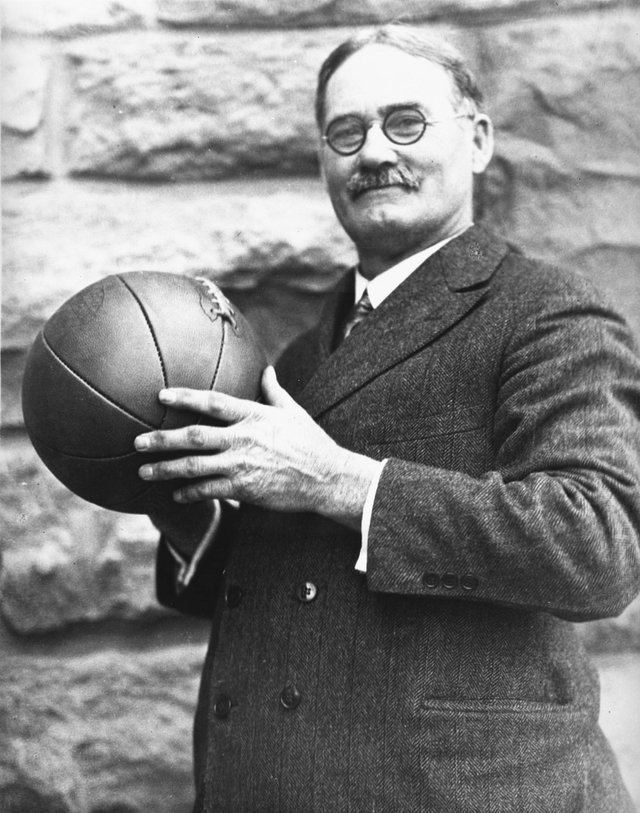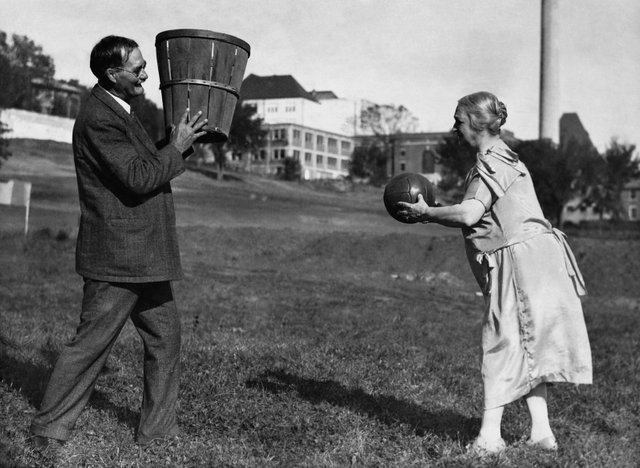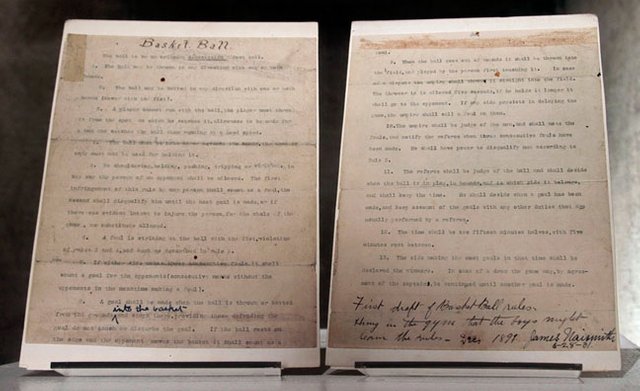HISTORY OF BASKETBALL: THE PRINCIPLE
It all started because we needed a sports activity that could be done inside the school of the YMCA (Young Men's Christian Association) of Springfield, Massachusetts, JAMES NAISMITH, physical education teacher in the school for that time
 http://www.mediatraining.cz/vystava-v-prazskem-palaci-ymca-oslavi-125-let-basketbalu/
http://www.mediatraining.cz/vystava-v-prazskem-palaci-ymca-oslavi-125-let-basketbalu/
In 1891, James Naismith tried to see how that would work, because the harsh winter that struck New England made any physical activity or outdoor sport impossible, the physical education of that time was based on German methods, very few indicated for the young boys. . Naismith was inclined to a game of ball, but the sports that were used during those years were for use of outer space or very physical, inappropriate to practice them in a reduced space like the gymnasium "of Mayan and Aztec origin, respectively, as background. Modern basketball, according to its inventor, the idea of using the shots in a basket as the goal of the game arose from an old game of his childhood called duck on a rock (or "duck on a rock") that consisted of reaching an object placed on a rock that threw a stone Naismith ordered boxes of approximately 45 cm2 to use as a target, but the school's concierge could only get him a basket of peaches, which he ordered to be hung on the railings of the upper gallery. at a certain height. https://menstois.ru/blog/43466282257/Basketbol---igra-dlya-chernyih,-pridumannaya-belyim
https://menstois.ru/blog/43466282257/Basketbol---igra-dlya-chernyih,-pridumannaya-belyim
Naismith had 18 students, so the first game would be 9 against 9, then 7 and in 1896 the known 5 against 5
"The board emerged to prevent the fans located in the gallery where the baskets hung, could hinder the entrance of the ball." The introduction of the board, in the early twentieth century, led to the play called rebound, which has become fundamental In the game, the baskets of peaches gave way to metal rings with a network without holes until they evolved to the current mesh . "
The rules developed on December 21, 1981 by James Naismith were a total of 13.
You can throw the ball with one or two hands in any direction.
You can touch the ball with one or both hands in any direction.
You can not run with the ball in your hands. The player must throw it from the place where it is carried.
The ball can only be held with your hands, arms or body.
It is not allowed to load, grab, push, hit or knock down an opponent. Violations of this rule constitute one and, if repeated, the player will be eliminated until a basket is scored. If the intention to hit the opponent on purpose is evident, the player will be eliminated for the rest of the game, without being able to be replaced.
By rules 3 and 4, it is not allowed to hit the ball with your fist. Infractions of this rule are sanctioned as described in rule 5.
If a team commits three consecutive fouls without the opponent having made any in that interval, the opposing team shall score one point.
The points are obtained when the ball is thrown or pale from the court, enters the basket and remains there without the attacking team touching or moving the basket. If the ball remains on the edge and an opponent moves the basket, it will count as a point for the attackers.
When the ball leaves the court, it will be thrown back into the field of play and will enter into possession of the first person to touch it. In case of doubt, the assistant referee will throw the ball high and two opponents will try to intercept it by jumping. The player who takes out has five seconds. If it takes longer, the ball passes to the opponent. If a team continually delays the game, it will commit a foul.
The assistant referee supervises the players and records fouls, and also advises the main referee when a team commits three consecutive fouls. You can eliminate the players according to rule 5.
11.The main referee observes the ball and decides when it is in play, when it has left the court and to whom it belongs. Decide when a point will be achieved, track the scoreboard and control the time along with the other obligations of an umpire.
12.The match consists of two parts of fifteen minutes each, with a break of five minutes between them.
13.The team that gets the most points is the winner. In case of a tie, the captains of the team may agree to play.
An extension until a basket is written down.

https://www.si.com/extra-mustard/2014/11/06/tbt-inventor-basketball-james-naismith
Very basic and rudimentary rules, but they were the basis for the beginning of this wonderful sport, this is the article where I get the information, very complete:https://es.wikipedia.org/wiki/Baloncesto#Historia_del_baloncesto
I hope you like it and leave a comment.
Congratulations! This post has been upvoted from the communal account, @minnowsupport, by joseluisgr from the Minnow Support Project. It's a witness project run by aggroed, ausbitbank, teamsteem, someguy123, neoxian, followbtcnews, and netuoso. The goal is to help Steemit grow by supporting Minnows. Please find us at the Peace, Abundance, and Liberty Network (PALnet) Discord Channel. It's a completely public and open space to all members of the Steemit community who voluntarily choose to be there.
If you would like to delegate to the Minnow Support Project you can do so by clicking on the following links: 50SP, 100SP, 250SP, 500SP, 1000SP, 5000SP.
Be sure to leave at least 50SP undelegated on your account.
Canal de Discord